- Home
- Annelie Wendeberg
The Devil's Grin: Illustrated Edition (An Anna Kronberg Thriller Book 1) Page 5
The Devil's Grin: Illustrated Edition (An Anna Kronberg Thriller Book 1) Read online
Page 5
‘Did the burglars leave something behind?’ he asked with an annoyed sideways glance at me.
‘What do ya mean?’ she said and, upon noticing Holmes’s impatient look, she added: ‘No, he hasn’t left nuffink.’
‘Have you seen him?’ I asked.
‘Of course not!’ she said and stomped off into the kitchen.
We made our way back to the station and I asked Holmes whether he had also got the impression the woman was hiding something.
He snorted. ‘Who isn’t?’
As we took our seats on the train back to London, he asked, ‘Is it possible to contract tetanus without an infected wound?’
‘Actually, it is. I was thinking about that last night. He could have got tetanus from eating bad or dirty meat. I have seen people eating cats, dogs ,and rats, and not having enough patience or wood for cooking them long enough will inevitably result in contracting whatever disease the animal had.’
Holmes’s eyes glazed over; he fell silent for a long time. We had almost reached London when he said, ‘We have to find Big Boots. Could he have contracted cholera, too?’
‘Not necessarily.’ I noticed the glint of hope in Holmes’s eyes fading. ‘Would a second cholera victim come in handy in helping you solve the case?’ I asked coldly.
He mirrored my stare and answered, ‘Without Big Boots, I will not be able to solve the case. There is not enough information.’
After another long and silent stretch, I asked, ‘Mr Holmes, I’m rather confused. Two men take a walk together to the Thames. One dies of tetanus while having cholera in the final stage and is thrown into the river; the same having restraint marks on his wrists and ankles. Both men steal food and a coat only hours before the coat is thrown into the water, together with the man who wore it. That makes absolutely no sense.’
‘Hmm…’ answered Holmes. And that was the last word he spoke until we parted in London.
— five —
One week after the Hampton incident, I found a stranger in my ward. Patients were gazing curiously at the man who lay on the floor in silent agony. His spine was arched far back, arms pulled to his side, fists clenched, and feet cramped into an almost half-moon shape.
In the short moment it took me to rush up to him, I saw I was too late. All I could do was kneel at his side, caress his head, and wait for the last seizure to release its grip.
Patients who were strong enough pulled themselves up from their cots for a better view. Anxious muttering started filling the room, mixed with anger and pity.
The man was perfectly still now, but for a barely noticeable vibration of all muscles in his tense body. His facial features were stretched into a devilish grin and his eyes were rolled far back into his skull. I placed my other hand on his chest. His heart was still beating, but the muscle spasms forbade him to breathe.
‘Just one more moment,’ I whispered.
His fluttering heart couldn’t accept its fate.
‘The pain will go away.’
A minute later, the strained heart fell silent. No one in the ward dared to speak. The presence of death sealed their lips. Only a few quiet coughs and the whimpering of a child cut through the void.
This was one of the hardest things to accept: the moment when death came no matter what I did, and then to let it happen and give both, man and death, peace. And strangely enough, once I accepted it, it gave me peace, too. As though death had touched my shoulder to salute an old acquaintance and to tell me that, when he came for me, I would be able to give him that very same friendly salute.
I closed the man’s eyes and left the ward to find someone who knew his identity. But I could not find a single soul who had even seen him being delivered. But that was impossible; he could not have walked in by himself.
Nonplussed, I walked back towards my ward and spotted the old porter, Mr Osburn, pacing the corridor. When he saw me, he waved with both arms and came running.
‘What is it?’ I barked and immediately regretted my harsh behaviour.
‘He’s dead, isn’t he?’ he said anxiously, pointing through the door.
‘Yes, he died. Did you know him?’
‘Oh, no!’ said Osburn, shaking his head, his large ears almost flapping. ‘Didn’t know him. Found him on the street, just in front of the gate.’
‘What?’
He was about to repeat himself, but I cut him off with a flick of my hand. ‘Did you see who dropped him off?’
‘No, Doctor. Am sorry, I didn’t see nothing.’
‘No one walking away? Or a cab driving off?’
He was thinking hard, staring at my shoes and pinching his earlobe. It made him look fragile and I began to feel sorry for the man. He appeared a little shrivelled, was friendly and forthcoming, but lonely in his porter house and probably even more so at home.
After a long moment, he pulled himself together and answered in a clear voice, ‘Now that you mention it, I heard the crack of a whip. Then the whinnying of a horse, just a minute afore I heard the gasping of a man. That man, you know, and then I found him. And then brought him here.’
‘Why didn’t you tell anyone that you’d brought him in?’ I tried to say it friendly, but failed.
He started stammering. ‘Am sorry, am sorry, I didn’t know what to do. He were a dying man, you know, and I just… I just…brought him here. And Billy from the disinfectors helped, and we didn’t see no doctor and no nurses and didn’t know what to do! I ran around and didn’t find no one, all the time thinking about that poor man dying. And then I came back and you were here and…and… He were dead.’
The old man had tried his best to help and I behaved like a snot-nose. ‘My apologies, Mr Osburn,’ I mumbled, ashamed. He stammered something unintelligible, then hobbled back to his porter house.
Before I returned to my patients, I asked a nurse to send the body to the anatomy lecture hall and to announce a presentation at four o’clock for students of medicine and bacteriology.
The contorted corpse atop the marble slab formed the centre of the hall and stuck out like a sore navel. Behind it were several semi-circular rows of students, with each row one step higher than its predecessor — reminiscent of an inverted pyramid. Most of the men were familiar to me and the few new ones in the front rows would soon push back. The room was packed; murmurs and the scraping of feet filled the air.
I coughed and most faces turned into my direction. The ones who knew the rules elbowed the new students who were about to light their cigarettes or pipes, resulting in a moment of confusion and muttering.
Anatomical amphitheatre. (9)
‘Ladies and gentlemen!’ I announced. It was my private bold joke, for only male students were admitted, not to mention male lecturers. After a short while, the hall fell quiet. My reputation here was such that the young men obeyed the few rules I set: no talking and no smoking, or they would have to leave immediately. But they also knew that there wouldn’t be a dull moment in the next two hours.
‘Today around noon, this man was found at the entrance gate. He had severe muscle spasms and was unable to walk. He was brought into the ward for infectious diseases and died within minutes. Can anyone tell me something about the cause of death?’
After a moment, a new student from the front row squared his shoulders and cried, ‘Tetanus!’
As expected.
I shook my head and smiled. ‘You might be wrong there.’
His face fell. ‘With all due respect, Dr Kronberg—’
‘I do hope so, Mister, but I fear you forgot to introduce yourself.’
‘My name is Wallace McFadin.’
‘A Scot! Very well, then! I like your music, Mr McFadin; do you play the bagpipes well?’
‘Er… I’m… I don’t play bagpipes.’
‘But you are Scottish?’
‘Yes, I am.’ His face had acquired a purple hue.
‘So if you are a Scot, why don’t you play the bagpipes?’
‘Just because I’m a Scot doesn’t mean I play bagpipes!’ He slammed his hand on the table in front of him.
‘Precisely!’ I said and saw that I had lost him. ‘My apologies, Mr McFadin, I used you for a demonstration. When you meet a Scot, he doesn’t necessarily play the bagpipes. The same is true for Mr Unknown here.’ I pointed to the man on the slab. ‘He died while exhibiting severe muscle spasms. You can see all the typical tetanus symptoms, including the remarkable devilish grin.’
Touching the man’s cold cheek, I wondered how many of my students felt repelled, how many pitied the man, and how many were amused by his shocking appearance. I looked back at them and continued. ‘But does that necessarily mean that he died from tetanus? No, it does not! I urge everyone in this room to be cautious and to not let our limited knowledge mask our senses. Just because we think it must have been tetanus that killed the man, doesn’t necessarily mean this was indeed the case. Preconception prohibits learning! Only after we have learned all there is to learn, after we have studied and observed, only then can we draw our conclusions. And do not expect to always find an answer to your questions. If you have done your very best and still cannot find an explanation, it is acceptable and honourable to say, “I do not know.”’
Several students were looking a bit perplexed now. I knew they had learned that superiority went hand-in-hand with practising medicine. This, in my opinion, was all rubbish.
‘You must see yourselves as scientists. And science is a work in progress, as is learning. You are solving a bacterial crime, gentlemen! I know your anatomy professors teach you to view the person you are dissecting as a subject. It is easier to slice apart a thing than a human being. But if you do so, you are ignoring important facts. The man could have died of an infectious disease, which makes him a human being w
ith a significant history. A history that you have to reveal! How else would you identify the causative agent and aid in the prevention of further infections? Read up on Dr Snow’s reports on the last cholera outbreak and how he found the pump on Broad Street as the vector of transmission. The man investigated the history of the cholera fatalities, and only that allowed him to successfully prevent any further spreading of the disease. When you wake up in the morning — every morning! — I want you to think of the only thing we know for sure, which is that in fact, we know very little. After you have done so, throw away one of your favourite preconceptions.’
Detail of Dr. John Snow’s map illustrating cholera cases near Broad Street, London, 1854. (10)
McFadin’s colour turned back to a normal shade and he almost looked proud to have been of such excellent service. Everyone was glued to my lips, and the show could begin.
‘Now, if you please…’ I waved them forward. That was unusual for anatomical demonstrations. Normally, students were asked to keep a respectful distance. Not during my lessons, though. I wanted them to observe closely, but I had to keep an eye on the faint-hearted ones; it usually helped them when they had something to do. So far, however, everyone looked brave. ‘Now tell me, what do you observe?’
Several students answered.
‘His clothes are dirty and old.’
‘He is thin.’
‘He is poor.’
‘He has brown hair.’
‘He is about forty years old.’
‘His body is distorted.’
I interrupted. ‘Thank you very much! We can safely assume that the man was poor, has brown hair, and was probably thirty years old. Poverty often makes one look older than one really is. And his body is distorted. Can anyone say where the man came from?’
Everyone shook his head.
‘Exactly. So far, we can’t tell.’ I searched his pockets and found them to be empty, then fetched a pair of scissors and cut away trousers, shirt, and underwear. I took off his shoes and placed everything next to the slab on the floor.
‘What can we see now?’ I asked the group.
‘He is naked!’ someone shouted, and we all had to laugh.
‘Excellent observation! I should have asked my question a little differently: what can we not see?’
That was always the hardest, detecting things that were off-pattern. As expected, all faces looked clueless.
‘How do people contract tetanus, typically?’ I hinted.
‘Through dirt in a deep wound,’ someone replied.
‘Do you see any?’ I asked.
The young men craned their necks and after a while, they shook their heads.
‘Shall we turn him?’ We did, but there were no wounds on his back, either.
‘How else can tetanus enter the body?’ No one answered, so I did. ‘You could eat an animal that had tetanus, for example.’
Suddenly, I remembered the Hampton man. I examined the man’s wrists and ankles but found no restraint marks. Then I checked the bends of both his elbows — nothing. The students looked at me enquiringly.
‘What else could produce these symptoms?’
Silence. Well, most of them hadn’t had toxicology yet, so I answered my own question again. ‘The alkaloid of the strychnos tree, commonly known as strychnine, killed Alexander the Great, for example.’
Murmurs filled the room and I waited for silence before I continued. ‘To be able to distinguish between the two, we have to open the man.’
I moved the table with my utensils closer to the slab. As expected, the new students pushed farther back the moment I took my largest knife and ran it through the corpse’s skin.
I could not find any infected areas in his gastrointestinal tract, but his heart had a swollen and dark, almost black area. I cut it open and held it to my nose — it stank. I couldn’t explain to my students how tetanus had got into the man’s heart. We were all mystified. I opened the cranium, sliced the hemispheres in sections, and found the typical liquid-filled lesions that only tetanus would produce, and not strychnine. I straightened up then and said, ‘It appears that Scots do play the bagpipes after all.’ McFadin grinned back at me.
After the lesson was over, I sent a wire to Holmes, wrapped the boots and clothes in wax paper, and left for home.
— six —
I walked along the buzzing streets, trying to avoid collision with other pedestrians. Street vendors advertised their goods and a variety of odours wafted through the heavy summer evening air — fish, pastries, smoke, blood, urine, and stale sweat. I bought an eel pie and ate it while walking, the package for Holmes clamped under my arm.
The direct way home was a three-mile journey, which I usually did not take. I also avoided walking or riding the same route on two consecutive days. It was my way to disconnect my two different lives — the male and the female. If anyone wanted to follow me from Guy’s to my home, they would have a hard time doing so.
When the weather permitted, I chose to walk; on other days I took an omnibus or a hansom cab to some place close to Bow Street.
Today was dry and sunny, a good evening for a stroll. I passed over London Bridge, turned left into Upper Thames Street all the way to Blackfriars Bridge, crossed the river a second time, on to Stamford, crossed it again at Waterloo Bridge, passing The Strand — sometimes I took supper here, but not today — walked along Charles Street and into Bow Street.
Blackfriars Bridge (11)
At the back door of the cobbler’s, I made my way up a narrow staircase, careful not to bump into the ceiling at the very top, and then turned into a dark corridor just underneath the attic.
I unlocked the door at the far end and entered a tiny windowless room. Very conveniently, my landlady had poor eyesight and it was easy to make her believe that I used the room as a storage place for costumes. I had told her that, at odd times, I or customers of mine would enter, pick a dress of their liking, and leave again. And as these few possessions represented my entire riches and I could not afford to lose them, I had persuaded her to allow me the installation of an extra lock at the door, to which only I had a key. It was an unusual arrangement, but she needed the extra shilling I paid her each week.
Once inside, I bolted the door to my secret dressing chamber, ready to start my daily ritual. I lighted the two oil lamps standing on either side of a locked wardrobe, slipped the key in and turned. The door creaked open and the looking glass fixed to its inside revealed a view of Dr Anton Kronberg, respectable member of the medical establishment, dressed in a sand-coloured cotton shirt, cotton trousers of a darker shade, and patent leather shoes. His hair was slicked back with Macassar oil. Well educated, distinguished, and peculiarly delicate. A few nurses at Guy’s thought him attractive. What a waste.
I unbuttoned the shirt, took it off, and draped it over a hanger, then pulled off my shoes, trousers, and stockings. My fingers probed inside the wrappings around my chest until one end of the bandages was found and I could free my compressed bosom. While rolling the cotton strip into a ball, the red stripes on my breasts slowly paled.
Pulling off my underpants, I grinned at the absurd appendage that stuck out between my legs. After four years, I still haven’t got used to my penis — fastened to a harness and made of the finest calf leather. It appeared authentic enough as long as no one examined it too closely. It had a narrow rubber tube inserted, with its other end attached to a small leather pouch filled with water. Occasionally I accompanied a colleague to the urinal, which drowned all doubts about my sex before they had the opportunity to surface.
Carefully, I took the contraption off, wrapped it in a towel, and stuck it into my doctor’s bag.
I gazed at my naked self and let the fact sink in that I was yet again a woman. Every morning I shed my female part and made myself believe I was a man. To me, it was the only way not to be afraid. I had no time for fear when I was at work. Rather, I had no time for fear at all. But this was naivety rather than courage. If my identity were revealed, I would simply start a new life elsewhere. That’s what I tried to make myself believe. But one part of my consciousness kept telling me how hard it would be to let go of all I had accomplished. Yet, I rarely listened.

 Vow
Vow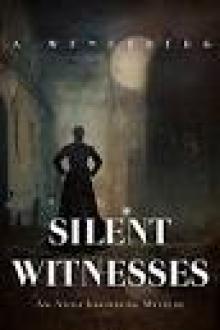 Silent Witnesses
Silent Witnesses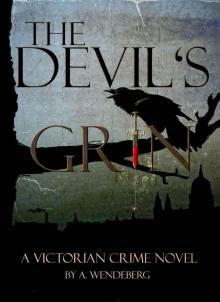 The Devil's Grin - A Crime Novel featuring Anna Kronberg and Sherlock Holmes (Kronberg Crimes)
The Devil's Grin - A Crime Novel featuring Anna Kronberg and Sherlock Holmes (Kronberg Crimes)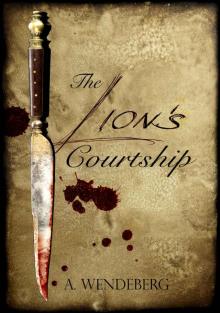 The Lion's Courtship: An Anna Kronberg Mystery
The Lion's Courtship: An Anna Kronberg Mystery 1/2986
1/2986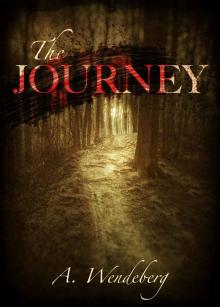 The Journey: Illustrated Edition (An Anna Kronberg Thriller)
The Journey: Illustrated Edition (An Anna Kronberg Thriller)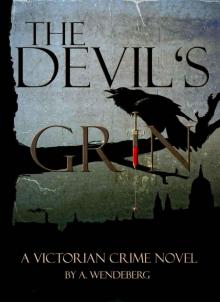 The Devil's Grin - a Crime Novel Featuring Anna Kronberg and Sherlock Holmes
The Devil's Grin - a Crime Novel Featuring Anna Kronberg and Sherlock Holmes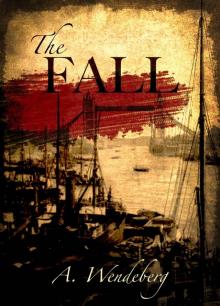 The Fall: Illustrated Edition (An Anna Kronberg Thriller Book 2)
The Fall: Illustrated Edition (An Anna Kronberg Thriller Book 2)